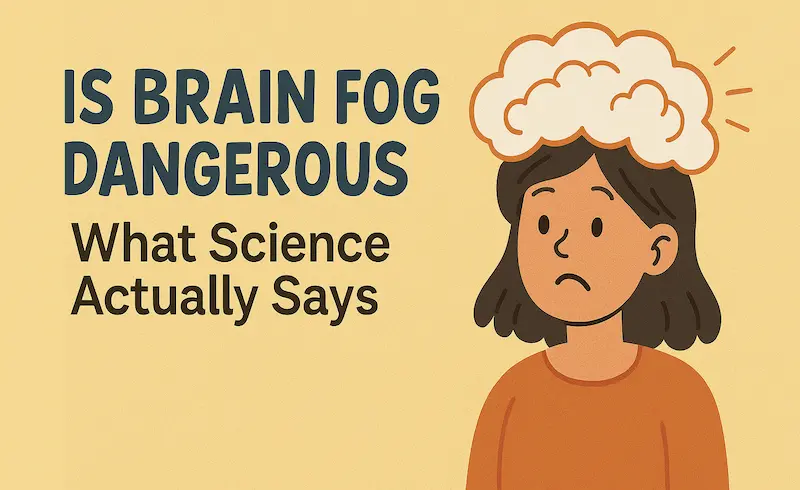That “My Brain Is Cotton Wool” Feeling
If you’ve ever stared at your screen at 3 PM, wondering if your brain has been replaced with mashed potatoes, you’ve met brain fog. It’s not a medical diagnosis, but it is a very real experience: trouble focusing, forgetting simple words, or just feeling like your mental gears are coated in syrup.
The scary part? Brain fog can feel like your brain is failing. The reassuring part? Science says it’s rarely dangerous on its own. In most cases, it’s a signal that something else—stress, hormones, sleep, diet, or health—is nudging your brain off balance.
So, is brain fog dangerous? Let’s look at what science actually tells us.
Brain Fog Isn’t a Disease—It’s a Symptom
First, the basics: brain fog is not a medical condition. It’s a catch-all description people use when thinking feels harder than it should. Researchers often call it “cognitive dysfunction” or “subjective cognitive complaints.”
The important bit? Brain fog itself doesn’t damage your brain. But it can signal something underneath that deserves attention—anything from stress and lack of sleep to autoimmune disease or medication side effects.
When Brain Fog Feels Scary—But Usually Isn’t
Here’s where the “fear vs. reassurance” balance comes in.
- The fear: “I’m losing my memory. Am I getting dementia?”
- The science: Occasional brain fog is common and temporary. Dementia involves progressive, worsening memory loss—not just random off days.
- The reassurance: If your brain fog comes and goes, and you’re otherwise functioning, it’s usually not dangerous.
Brain fog often improves once the underlying trigger (like stress, hormones, or poor sleep) is addressed.
Hormones and Brain Fog
Menopause & Perimenopause
Hot flashes, mood swings, night sweats… and yes, brain fog. Fluctuating estrogen levels during menopause affect neurotransmitters like serotonin and dopamine, which play roles in memory and focus. The good news? For most women, these foggy episodes are temporary.
During Your Period
Many people notice fogginess just before or during their period. Hormonal shifts, plus changes in iron levels and sleep quality, can mess with mental clarity. Again: annoying, not dangerous.
ADHD and Brain Fog
People with ADHD often describe brain fog on top of distractibility. Science suggests it’s tied to differences in dopamine regulation—making it harder to stay focused or shift between tasks.
Is it dangerous? Not inherently. But unmanaged ADHD can lead to burnout, anxiety, and lower quality of life. Recognizing the fog is often the first step toward strategies that help.
Brain Fog After Eating
If you’ve ever demolished a heavy pasta lunch and then needed a nap (and maybe a new brain), you’ve had post-meal brain fog.
Possible culprits:
- Blood sugar spikes and crashes
- Large, high-carb or high-fat meals
- Food intolerances (like gluten or dairy for some people)
It’s rarely dangerous, but if foggy thinking always follows meals, it’s worth exploring diet triggers.
Stress, Burnout, and Mental Overload
Stress hormones like cortisol prepare your body for “fight or flight.” But when they stay elevated, your brain starts rationing focus like it’s toilet paper in 2020.
Chronic stress can shrink areas of the brain related to memory (like the hippocampus). That sounds terrifying, but here’s the reassurance: studies show these changes often reverse once stress is reduced.
Burnout brain fog is your body’s way of screaming: “Stop before you crash.” Ignoring it isn’t catastrophic overnight, but long-term burnout has ripple effects on both physical and mental health.
When Brain Fog Might Signal Something Bigger
While most brain fog is harmless and temporary, there are times when you should take it seriously. Seek medical advice if brain fog is:
- Persistent and worsening (not just bad days, but weeks or months)
- Interfering with daily life (forgetting important appointments, struggling to do your job)
- Paired with other symptoms like numbness, severe headaches, vision problems, or sudden confusion
These could signal thyroid disorders, autoimmune conditions, nutrient deficiencies, or neurological issues.
So… Is Brain Fog Dangerous?
Short answer: usually no. It’s more of a warning light on the dashboard than the engine falling out of the car.
- Most common causes: stress, sleep, hormones, diet, medications
- Danger level: low in isolation, higher if it’s persistent or paired with other symptoms
- What helps: lifestyle tweaks (sleep, exercise, balanced meals, stress management) and medical evaluation if it doesn’t improve
Key Takeaways (a.k.a. Your Brain Fog Cheat Sheet)
- Brain fog isn’t a disease—it’s a symptom.
- Hormonal changes (period, menopause), ADHD, stress, and diet are common triggers.
- It feels scary but rarely means lasting brain damage.
- Persistent or worsening brain fog? That’s your cue to check in with a doctor.
- For most people, addressing the root cause clears the fog.
Disclaimer
This article is for informational purposes only and is not medical advice. If brain fog is frequent, severe, or affecting your daily life, talk to a healthcare professional.

Alex Keane is a health writer and gut health researcher with a personal mission: help people stop feeling like garbage for no clear reason. After years of dealing with brain fog, digestive issues, and 3am anxiety spirals, Alex started digging into the connection between the gut and the mind — and never looked back.
When not writing about microbiomes, Alex is usually found experimenting with fermented foods, walking obsessively, or trying not to buy more supplements off Instagram.
Alex is not a doctor, and that’s probably for the best.

